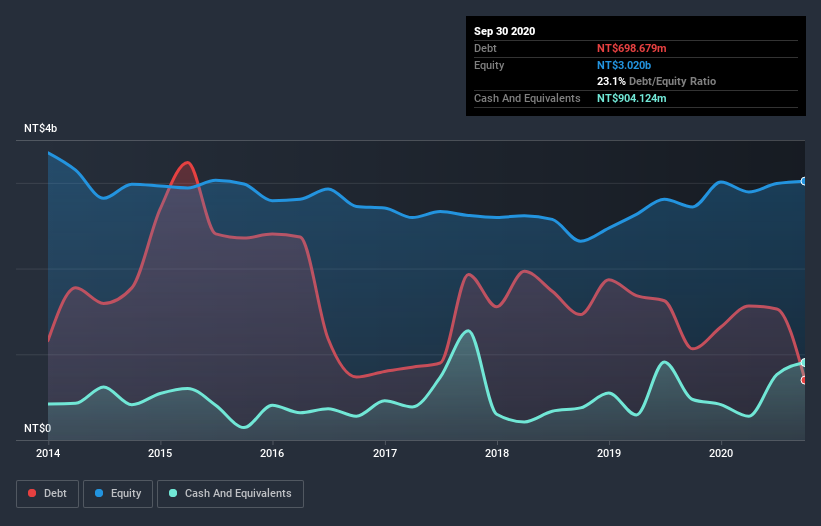- Taiwan
- /
- Consumer Durables
- /
- TWSE:1626
Airmate (Cayman) International Co (TPE:1626) Has A Pretty Healthy Balance Sheet

The external fund manager backed by Berkshire Hathaway's Charlie Munger, Li Lu, makes no bones about it when he says 'The biggest investment risk is not the volatility of prices, but whether you will suffer a permanent loss of capital.' When we think about how risky a company is, we always like to look at its use of debt, since debt overload can lead to ruin. As with many other companies Airmate (Cayman) International Co Limited (TPE:1626) makes use of debt. But should shareholders be worried about its use of debt?
When Is Debt A Problem?
Generally speaking, debt only becomes a real problem when a company can't easily pay it off, either by raising capital or with its own cash flow. Part and parcel of capitalism is the process of 'creative destruction' where failed businesses are mercilessly liquidated by their bankers. However, a more common (but still painful) scenario is that it has to raise new equity capital at a low price, thus permanently diluting shareholders. Of course, the upside of debt is that it often represents cheap capital, especially when it replaces dilution in a company with the ability to reinvest at high rates of return. The first thing to do when considering how much debt a business uses is to look at its cash and debt together.
Check out our latest analysis for Airmate (Cayman) International Co
What Is Airmate (Cayman) International Co's Debt?
As you can see below, Airmate (Cayman) International Co had NT$698.7m of debt at September 2020, down from NT$1.06b a year prior. However, its balance sheet shows it holds NT$904.1m in cash, so it actually has NT$205.4m net cash.

A Look At Airmate (Cayman) International Co's Liabilities
According to the last reported balance sheet, Airmate (Cayman) International Co had liabilities of NT$5.33b due within 12 months, and liabilities of NT$1.05b due beyond 12 months. Offsetting these obligations, it had cash of NT$904.1m as well as receivables valued at NT$2.20b due within 12 months. So it has liabilities totalling NT$3.28b more than its cash and near-term receivables, combined.
This deficit is considerable relative to its market capitalization of NT$3.49b, so it does suggest shareholders should keep an eye on Airmate (Cayman) International Co's use of debt. This suggests shareholders would be heavily diluted if the company needed to shore up its balance sheet in a hurry. Despite its noteworthy liabilities, Airmate (Cayman) International Co boasts net cash, so it's fair to say it does not have a heavy debt load!
It is just as well that Airmate (Cayman) International Co's load is not too heavy, because its EBIT was down 62% over the last year. Falling earnings (if the trend continues) could eventually make even modest debt quite risky. There's no doubt that we learn most about debt from the balance sheet. But it is Airmate (Cayman) International Co's earnings that will influence how the balance sheet holds up in the future. So if you're keen to discover more about its earnings, it might be worth checking out this graph of its long term earnings trend.
Finally, a business needs free cash flow to pay off debt; accounting profits just don't cut it. Airmate (Cayman) International Co may have net cash on the balance sheet, but it is still interesting to look at how well the business converts its earnings before interest and tax (EBIT) to free cash flow, because that will influence both its need for, and its capacity to manage debt. Over the last two years, Airmate (Cayman) International Co actually produced more free cash flow than EBIT. There's nothing better than incoming cash when it comes to staying in your lenders' good graces.
Summing up
While Airmate (Cayman) International Co does have more liabilities than liquid assets, it also has net cash of NT$205.4m. And it impressed us with free cash flow of NT$908m, being 365% of its EBIT. So we don't have any problem with Airmate (Cayman) International Co's use of debt. When analysing debt levels, the balance sheet is the obvious place to start. But ultimately, every company can contain risks that exist outside of the balance sheet. Take risks, for example - Airmate (Cayman) International Co has 3 warning signs we think you should be aware of.
If you're interested in investing in businesses that can grow profits without the burden of debt, then check out this free list of growing businesses that have net cash on the balance sheet.
If you decide to trade Airmate (Cayman) International Co, use the lowest-cost* platform that is rated #1 Overall by Barron’s, Interactive Brokers. Trade stocks, options, futures, forex, bonds and funds on 135 markets, all from a single integrated account. Promoted
New: Manage All Your Stock Portfolios in One Place
We've created the ultimate portfolio companion for stock investors, and it's free.
• Connect an unlimited number of Portfolios and see your total in one currency
• Be alerted to new Warning Signs or Risks via email or mobile
• Track the Fair Value of your stocks
This article by Simply Wall St is general in nature. It does not constitute a recommendation to buy or sell any stock, and does not take account of your objectives, or your financial situation. We aim to bring you long-term focused analysis driven by fundamental data. Note that our analysis may not factor in the latest price-sensitive company announcements or qualitative material. Simply Wall St has no position in any stocks mentioned.
*Interactive Brokers Rated Lowest Cost Broker by StockBrokers.com Annual Online Review 2020
Have feedback on this article? Concerned about the content? Get in touch with us directly. Alternatively, email editorial-team@simplywallst.com.
About TWSE:1626
Airmate (Cayman) International Co
Engages in the research, design, development, production, and sale of household appliances in China, Japan, South Korea, and internationally.
Adequate balance sheet and slightly overvalued.
Market Insights
Community Narratives




